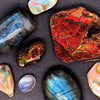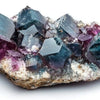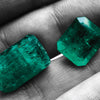Emeralds: The Green Gems of Legends and Empires
- by Greta Fontanella

Emeralds, with their deep verdant hue, have been cherished since antiquity. Ancient civilizations—from the Egyptians and Greeks to the Incas and Mughals—believed emeralds held mystical properties, offering insight, foresight, and protection. But the true magic of emeralds lies in their complex formation, captivating color, and in the fact that each stone is utterly unique.
The Science Behind the Green
Emeralds are a green variety of beryl, a mineral composed of beryllium aluminum silicate (Be₃Al₂Si₆O₁₈). What makes a beryl an emerald is the presence of chromium, vanadium, or both — rare elements that give emeralds their rich green color.
These elements are not often found in the same environment as beryllium, which makes emerald formation a geological miracle. This rarity contributes to their high value.
Origins and Mining Locations
The most famous emeralds come from:
-
Muzo, Chivor, and Coscuez (Colombia) — known for intense color and soft glow
-
Zambia — slightly darker emeralds with exceptional clarity
-
Brazil — more accessible stones, often with lighter or bluish tones
-
Afghanistan and Pakistan — small production, but high-quality stones
Each region imparts its own character, with Colombian emeralds still considered the global standard for richness of color.
Clarity, Jardin, and Treatments
Emeralds are typically included, and that's okay! Their inclusions — known poetically as “jardin” — are accepted as part of their identity.
To improve appearance, emeralds are often oiled using cedarwood oil, filling surface-reaching fractures. This is a traditional treatment, but:
-
It is not permanent
-
Stones may require re-oiling over time
-
Exposure to heat or chemicals can damage treated areas
This also means emeralds are not ideal for high-impact jewelry like rings or bracelets unless designed with protection in mind.
Durability and Care
Rated 7.5–8 on the Mohs scale, emeralds are relatively hard but brittle, making them vulnerable to chipping if not handled carefully.
Recommended care:
-
Avoid ultrasonic or steam cleaning
-
Remove before sports or manual tasks
-
Store separately to avoid scratches
Symbolism and History
-
Beloved by Cleopatra, who claimed ownership of all Egyptian emerald mines
-
Used in Mughal empire treasures, often carved with prayers and poetry
-
Believed to grant foresight, rebirth, and even cure disease
Today, emeralds symbolize hope, renewal, and love, and are the birthstone for May.
- Posted in:
- beryl
- Cleopatra jewelry
- Colombian emeralds
- emerald
- gemstone care
- gemstone lore
- gemstone treatments
- green gemstones
- jardin inclusions
- Mughal emeralds





